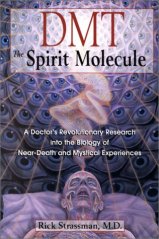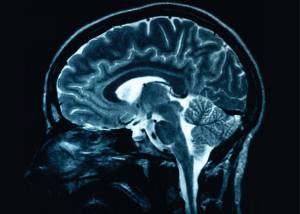If you travel around paranormalist circles as I do, or have done a fair amount of reading about consciousness and Near-Death Experience research, you may have come across some confusion online about dimethyltryptamine (DMT). DMT is a compound that is found throughout the plant and mammal kingdom, and acts as a psychedelic drug when ingested. Many proponents of its use as a hallucinogen say it is produced naturally in the human brain; specifically, by our pineal gland. Others believe that is merely speculation. But is it really true? If not, why do so many people seem to believe it? Let’s see if we can find out.
 Much of the confusion seems to come from two sources: Dr. Rick Strassman and Joe Rogan. In 2000, Strassman published a book called “DMT: The Spirit Molecule” which offered up the pineal gland hypothesis. Furthermore, he proposed the wild speculation that DMT may provide access to everything from parallel universes to alien beings through the use of superconductive quantum computing of the human brain. Whatever that means. Though Strassman was clear that his hypothesis was not proven, and admitted he knew “little about theoretical physics,” it hasn’t stopped many from repeating his ideas as fact.
Much of the confusion seems to come from two sources: Dr. Rick Strassman and Joe Rogan. In 2000, Strassman published a book called “DMT: The Spirit Molecule” which offered up the pineal gland hypothesis. Furthermore, he proposed the wild speculation that DMT may provide access to everything from parallel universes to alien beings through the use of superconductive quantum computing of the human brain. Whatever that means. Though Strassman was clear that his hypothesis was not proven, and admitted he knew “little about theoretical physics,” it hasn’t stopped many from repeating his ideas as fact.
One of those people is Joe Rogan, a popular stand-up comedian and podcast host who fancies himself something of an expert on a variety of topics which he seems to have limited knowledge about. He has been, at various times, a staunch moon landing hoax conspiracy theorist, as well as one who gave credence to thoroughly debunked 9/11 “truther” myths. But he also speaks a lot about psychedelics and altered states of consciousness. Several years ago, when prompted by a caller during a radio show interview, Rogan launched into a roughly 10 minute diatribe about DMT, how it is produced by the pineal gland and how, while using it, “literally you are transported into another fucking dimension.” The audio of Rogan’s reply went viral, and has been repeated ad nauseam by a number of internet mystics.
Instead of merely relying on internet resources to answer our question, I decided to get more information from a couple of neuroscientists. First, I had my friend Bobby Nelson email Dr. Indre Viskontas. She holds a Ph.D in cognitive neuroscience and is an editor of the journal Neurocase. She wrote that despite the fact DMT, “shares a similar molecular structure with serotonin and melatonin, a class of amines, and neurotransmitters with wide-reaching effects in the brain,” there was no evidence that it’s produced there. She also linked us to a study that showed where small amounts have been found in urine and stool. However, Dr. Viskontas told me later that this is “not evidence that the brain made them or that they came from inside the brain,” and that it was “just as likely that they were ingested or made by some other body part and never entered the brain.”
 But I wanted to get a second opinion, so I also contacted Dr. Bryan Yamamoto, a professor and Chairman of the neuroscience department at the University of Toledo, to ask the same question. Yamamoto, who holds a Ph.D from Syracuse University, agreed with Viskontas. He wrote, “I know of no evidence that DMT is produced anywhere in the body. It’s chemical structure is similar to serotonin and melatonin but their endogenous actions are very different from DMT.”
But I wanted to get a second opinion, so I also contacted Dr. Bryan Yamamoto, a professor and Chairman of the neuroscience department at the University of Toledo, to ask the same question. Yamamoto, who holds a Ph.D from Syracuse University, agreed with Viskontas. He wrote, “I know of no evidence that DMT is produced anywhere in the body. It’s chemical structure is similar to serotonin and melatonin but their endogenous actions are very different from DMT.”
So, what’s the answer? Is DMT produced in our brain? While some cling to evidence that suggests it is, there is also very good reason to be skeptical. Putting together my own minimal review of the available literature, as well as the direct responses from two scientists with a level of expertise in the field of neuroscience, it leads me to believe that the evidence is limited and, therefore, the probability not so great.
But let’s face it: few of us reading this are likely to be scientists with a sufficient amount of expertise to say one way or another. If you still have doubts, the best thing you can do is avoid speculating or pretending to know what you don’t, and simply reserve judgment until you have more facts. You may not have the satisfaction of knowing an answer for sure, but at least you’ll be more intellectually honest in the process.